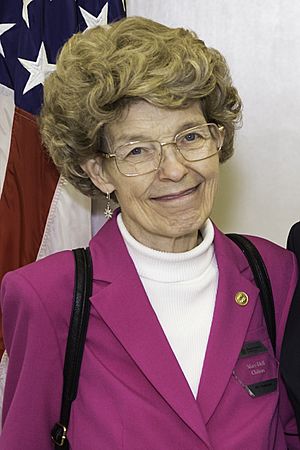Mary-Dell Chilton facts for kids
Quick facts for kids
Mary-Dell Chilton
|
|
|---|---|
 |
|
| Born | February 2, 1939 |
| Alma mater | University of Illinois at Urbana–Champaign |
| Known for | First genetically modified plants |
| Awards | World Food Prize, National Inventors Hall of Fame |
| Scientific career | |
| Institutions | Syngenta Biotechnology Inc |
| Thesis | Transforming Activity in Single-Stranded DNA from Bacillus subtilis (1967) |
| Doctoral advisor | Benjamin D. Hall |
| Notable students | Michael W. Bevan, Elizabeth E. Hood |
Mary-Dell Chilton, born on February 2, 1939, in Indianapolis, Indiana, is a very important scientist. She helped start the field of modern plant biotechnology. This means she changed how we understand and work with plants at a tiny, genetic level.
Contents
Early Life and Education
Mary-Dell Chilton went to a private school when she was young. She studied chemistry at the University of Illinois Urbana-Champaign. There, she earned both her first degree (B.S.) and her advanced degree (Ph.D.). After that, she continued her research at the University of Washington in Seattle.
Career and Groundbreaking Research
Dr. Chilton taught and did research at Washington University in St. Louis. In the late 1970s and early 1980s, she led a team of scientists. Together, they created the very first transgenic plants. These are plants that have had new genes added to them.
Discovering How Bacteria Change Plants
In 1977, Dr. Chilton made a big discovery. She showed that a small piece of DNA from a bacterium called Agrobacterium could move into a plant's own DNA. This bacterium causes a plant disease called crown gall.
Her research also found something amazing about Agrobacterium. She learned that the genes that cause disease could be taken out of the bacterium. Even without these disease-causing genes, the bacterium could still put its DNA into plant cells. This process changes the plant's genome, which is like its instruction manual.
Creating the First Genetically Modified Plants
Dr. Chilton called this process "disarming" the bacterial plasmid. A plasmid is a small, circular piece of DNA. By disarming the Agrobacterium, she made it safe to use. In 1983, she and her team used this disarmed bacterium to create the first genetically modified plants. Because of her important work, some people call her the "queen of Agrobacterium."
Dr. Chilton has written more than 100 scientific papers. She is now a Distinguished Science Fellow at Syngenta Biotechnology, Inc. She started her career in companies in 1983 with CIBA-Geigy Corporation. This company later became part of Syngenta.
Awards and Special Honors
Mary-Dell Chilton has received many awards for her work with Agrobacterium tumefaciens.
- She received an honorary doctorate from the University of Louvaine.
- She was given the John Scott Medal from the City of Philadelphia.
- She became a member of the United States National Academy of Sciences.
- She earned the Benjamin Franklin Medal in Life Sciences. This award came from the Franklin Institute.
In 2011, the Crop Science Society of America honored her with their Presidential Award.
Recognized by Syngenta and Other Institutions
To celebrate her many achievements, Syngenta created the Mary-Dell Chilton Center in 2002. This new building is an administrative and conference center. It was added to the company's facility in Research Triangle Park, North Carolina.
In June 2013, she was named a winner of the important 2013 World Food Prize.
In 2015, Dr. Chilton was chosen for the National Inventors Hall of Fame. In 2020, she was one of eight women featured in a special display. This display, called "The Only One in the Room," was at the Smithsonian National Museum of American History.
The American Society of Plant Biologists has also recognized Dr. Chilton as a Pioneer Member.
In 2023, President Biden awarded Dr. Chilton the National Medal of Technology and Innovation. This is a very high honor for scientists and inventors.
See also
 In Spanish: Mary-Dell Chilton para niños
In Spanish: Mary-Dell Chilton para niños
 | Percy Lavon Julian |
 | Katherine Johnson |
 | George Washington Carver |
 | Annie Easley |

